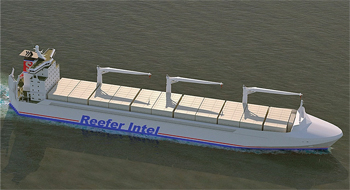Denmark’s Knud E. Hansen, in close cooperation with Switzerland’s Reefer Intel and Sweden’s Stena RoRo, has developed a new ro-ro reefer vessel design that has 45 per cent more capacity than traditional lo-lo reefers, and can load and unload in only 12 hours compared to the average 36-48 hours for conventional vessels.
Specifically developed for the banana trade between Latin America and Europe, the design measures 199m by 29m and will sail on a loaded draught of 8.6m. It can load a total of 11,500 high cube pallets, with 7,400 pallets stacked on four internal decks and the balance in 206 containers carried on deck. The four internal decks are divided into ten individual compartments, each with their own cooling and atmosphere systems.
A two-stroke turbo-charged slow-speed marine engine of 25,340kW output will provide a speed of 20.5 knots. The ship’s rapid discharge time means that it can maintain its sailing schedule at a lower speed than conventional reefers, which will result in significant fuel and emissions savings while also reducing port fees. JS


